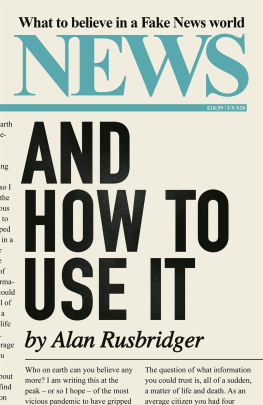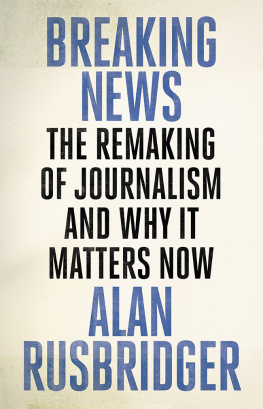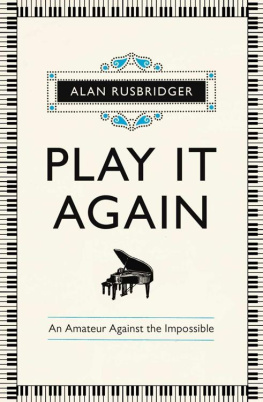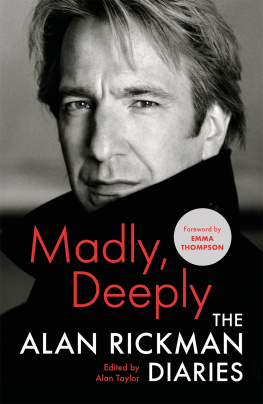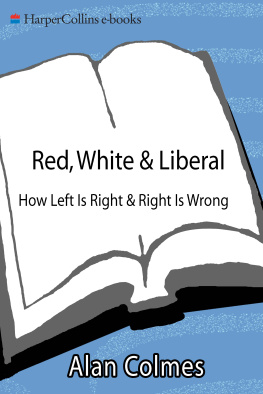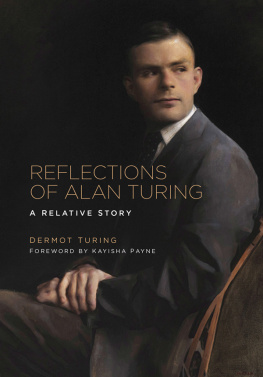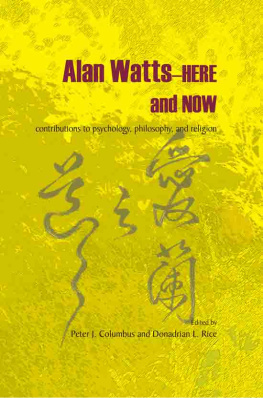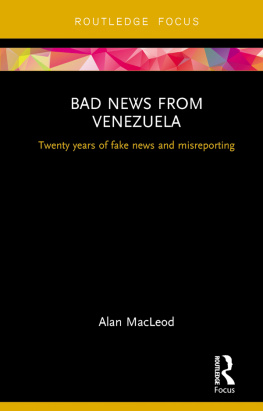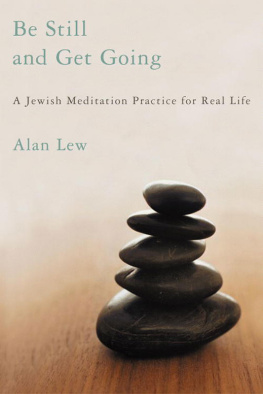Alan Rusbridger - News and How to Use It
Here you can read online Alan Rusbridger - News and How to Use It full text of the book (entire story) in english for free. Download pdf and epub, get meaning, cover and reviews about this ebook. publisher: Canongate Books, genre: Politics. Description of the work, (preface) as well as reviews are available. Best literature library LitArk.com created for fans of good reading and offers a wide selection of genres:
Romance novel
Science fiction
Adventure
Detective
Science
History
Home and family
Prose
Art
Politics
Computer
Non-fiction
Religion
Business
Children
Humor
Choose a favorite category and find really read worthwhile books. Enjoy immersion in the world of imagination, feel the emotions of the characters or learn something new for yourself, make an fascinating discovery.
- Book:News and How to Use It
- Author:
- Publisher:Canongate Books
- Genre:
- Rating:4 / 5
- Favourites:Add to favourites
- Your mark:
- 80
- 1
- 2
- 3
- 4
- 5
News and How to Use It: summary, description and annotation
We offer to read an annotation, description, summary or preface (depends on what the author of the book "News and How to Use It" wrote himself). If you haven't found the necessary information about the book — write in the comments, we will try to find it.
News and How to Use It — read online for free the complete book (whole text) full work
Below is the text of the book, divided by pages. System saving the place of the last page read, allows you to conveniently read the book "News and How to Use It" online for free, without having to search again every time where you left off. Put a bookmark, and you can go to the page where you finished reading at any time.
Font size:
Interval:
Bookmark:


Also by Alan Rusbridger
Breaking News
Play It Again
First published in Great Britain, the USA and Canada in 2020 by Canongate Books Ltd, 14 High Street, Edinburgh EH1 1TE
Distributed in the USA by Publishers Group West and in Canada by Publishers Group Canada
canongate.co.uk
This digital edition first published in 2020 by Canongate Books
Copyright Alan Rusbridger, 2020
The right of Alan Rusbridger to be identified as the
author of this work has been asserted by him in accordance
with the Copyright, Designs and Patents Act 1988
British Library Cataloguing-in-Publication Data
A catalogue record for this book is available on
request from the British Library
ISBN 978 1 83885 161 3
eISBN 978 1 83885 162 0
For the Committee to Protect Journalists,
whose mission is, sadly, ever more necessary
Preface
Who on earth can you believe any more?
I am writing this at the peak or so I hope of the most vicious pandemic to have gripped the world in a century or more. The question of what information you can trust is, all of a sudden, a matter of life and death.
As an average citizen you have four choices about where to find information on this new plague.
You can believe the politicians. That might work if you live in, say, New Zealand or Germany less so if you are in Brazil, Russia, China, Hungary or the United States. And maybe not so much in Britain.
What about the scientists? As politicians have struggled for authority or even understanding some leaders thrust scientists and doctors into the limelight. We began to absorb many lessons in epidemiology, immunology, exponential curves, antibody tests, vaccines and the modelling of viral infections. And we learned that scientists disagree with each other. They harbour and value doubts. They even change their minds. To some this is reassuring; to others, confusing.
Or we can turn to our peers. As always, there is good and bad on social media; expertise and madness; inspiration and malicious nonsense. New words have been coined infodemic and infotagion are just two to describe an environment of viral information chaos which nevertheless has proved massively addictive as people the world over stumble in search of light.
And then there is journalism. There has been much to admire here: some brave reporting from inside hospitals and on the streets; some clear and honest analysis; some tough investigations into governmental advice and inaction; some brilliant visualisation of data and some admirably simple explanations of complex concepts. The best news organisations have performed a real, vital public service.
But as with social media there is bad to counter the good. Some were slow to grasp the immensity of what was happening. There will be a special place in journalistic hell for Fox News and its initial torrent of Trump-echoing propaganda. That coverage will have helped contribute to numberless deaths. There was lamentable confusion about how to cover the nightly parade of presidential lies, sulks, boasts and vainglorious irrelevance that flagged itself as public information. There was uncertainty about how to communicate risk.
Some news outlets initially, at least seemed unable to imagine the scale of what was happening: it was easier to report on what videos Boris Johnson was watching in his hospital bed than on the hundreds dying every day all around. The newsrooms that had jettisoned their health or science correspondents struggled. The idiots who suggested that 5G phone masts could be spreading the disease encouraged arson and trashed their own brand. So, it was a mixed picture.
Covid-19 could not have announced itself at a worse time in terms of the question about whom to believe. Survey after survey has shown unprecedented confusion over where to place trust. Nearly two-thirds of adults polled by Edelman in 2018 said they could no longer tell a responsible source of news from the opposite.
This was not how it was supposed to be.
The official script for journalism was that once people woke up to the ocean of rubbish and lies all around them theyd come back to the safe harbour of professionally-produced news. You couldnt leave this stuff to amateurs or give it away for free. Sooner or later people would flood back to the haven of proper journalism.
This official narrative was not completely wrong but nor was it right in the way the optimists hoped it would be. There was a surge of eyeballs to mainstream media sites, but it was too soon to judge if the increased traffic would remotely compensate for the drastic loss of revenues as copy sales plummeted and advertising disappeared. It normally didnt.
At the very moment when the UK government recognised journalists as essential workers, the industry itself looked more fragile than ever. Surveys of trust showed the public (especially the older public) relying on journalists, but not trusting them. Another Edelman special report in early March 2020 found journalists at the bottom of the trust pile, with only 43 per cent of those surveyed holding the view that you could believe them to tell the truth about the virus. That compared with 63 per cent for a person like yourself.
As the pandemic wore on, so trust in both UK politicians and news organisations slumped. Between April and May 2020, according to Reuters Institute for the Study of Journalism (RISJ), trust in the government plunged a full 19 points partly, it was thought, as a result of newspaper investigations which appeared to show double standards between what the government was saying and what its top advisers were actually doing. But if reporters expected gratitude for their efforts they were disappointed: the same period saw an 11-point fall in trust in news organisations.
I spent most of my working life in journalism: I would like people to believe the best of it. I like the company of journalists and, as an editor, was frequently lost in admiration for colleagues on the Guardian and beyond who were clever, brave, resourceful, quick, honest, perceptive, knowledgeable and humane.
But it was impossible to be blind to so much journalism that was none of those things: editorial content that was stupid, corrupt, ignorant, aggressive, bullying, lazy and malign. But it all sailed under the flag of something we called journalism. Somehow we expected the public to be able to distinguish the good from the bad and to recognise its not all the same, even if we give it the same name.
The official story paints journalists as people who tell truth to power. But truth is a big word, and we seldom like to reflect on our own power.
Now, four years on from being full-time in the newsroom, I want to bring an insiders perspective to the business of journalism, but also look at it from the outside. How can we explain journalism to people who are by and large sceptical which is broadly what most of us would want our fellow citizens to be? This book aims to touch on some of the things about journalism that might help a reader decide whether it deserves their trust, and offer a glimpse to working journalists of how they are viewed by the world outside.
What follows is in alphabetical form and is, inevitably, quite subjective and a bit random. It deals with some aspects of how journalism at its best and worst is practised, thought about, paid for, owned, controlled and influenced. To many insiders these are givens: to many outsiders they are mysteries.
Font size:
Interval:
Bookmark:
Similar books «News and How to Use It»
Look at similar books to News and How to Use It. We have selected literature similar in name and meaning in the hope of providing readers with more options to find new, interesting, not yet read works.
Discussion, reviews of the book News and How to Use It and just readers' own opinions. Leave your comments, write what you think about the work, its meaning or the main characters. Specify what exactly you liked and what you didn't like, and why you think so.

